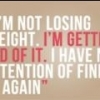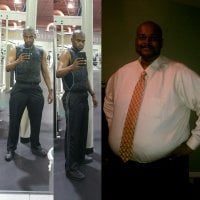Search the Community
Showing results for 'alcohol'.
Found 17,501 results
-

Weight Gained Since Having Gastric Sleeve Surgery
Kindle replied to sleeve 4 me's topic in POST-Operation Weight Loss Surgery Q&A
For all of you that have regained, did you ever seek psychiatric help? You are all admitted addicts and/or turned to old eating habits as soon as something bad happened in you life. We got help from a bariatric surgeon, but what we really need is help with our heads. What would you say to a meth addict who had the choice to get help and regain control of their life but instead chose to just stay in their room and keep using? Turning to bad eating habits is no different than giving in to a crack habit. I actually never sought counseling before or after WLS because I never had issues with the process. In fact, I found it quite easy to lose and maintain when everything was rose colored and happy. But when my best friend committed suicide last year, I knew I couldn't cope on my own. I was depressed, angry, sad, confused, and ready to put a bullet into my head as well. But since I couldn't do that to my parents, I had to figure out another option. I REFUSED to turn to my old standbys of food and alcohol....but that's all I knew how to do. After all, I spent 18 months drunk and gaining weight after my brother died. I was really good at it. With no relief in sight, I finally sought the help of a grief counsellor. I'm not saying it was a magical fix, I still struggle and I barely function through my fog of grief some days. But I'm still here and I am learning new coping mechanisms. We don't even talk about weight related issues because that's not the problem. The grief is the problem. And for most people who have WLS, eating isn't really the problem, either, life's stressors are the problem. You just don't know any other way to cope besides turning to food. But in the end WLS is a waste of time and money if you don't address the REAL reasons behind why you abuse food. You've GOT to learn how to deal with life without using food to cushion the blows. If time or money are constraints to getting help, there are alternatives. OA is free. Larger cities, hospitals, even churches have free support groups. It doesn't have to be bariatric specific support. It isn't about what to eat and what not to eat......You already know all that. It's about dealing with an addiction and learning new life skills. Even something as simple as meditation or yoga can be helpful. Smart Recovery is a very good addiction recovery program and an alternative to the better known 12 step programs like AA and OA. Its based more in CBT and treats addiction like a behavior that you have the ability to change rather than treating you like a victim of a disease. They have online forums and meetings, in person meetings, and the handbook to get started on your own is just $8.00. I've found it very empowering and a nice supplement to my counseling. There is no shame in seeking help. Life is hard and sometimes we need a stronger hand than our own to drag us through the worst parts. (Sorry for the long rant) -


Best Protein Bars?
Sajijoma replied to rydersmama's topic in General Weight Loss Surgery Discussions
I use Pure Protein bars. They have sugar alcohols which can upset your digestive track of you eat too much, but at 4 months post op, I can really only handle half a bar. -


Did everyone have a Pre-op diet?
Miss Mac replied to coleycole127's topic in PRE-Operation Weight Loss Surgery Q&A
My ultrasound and CT scan showed that I had an enlarged liver and Non Alcoholic Fatty Liver Disease. I had to do a three month diet of 1200 low carb calories with 60 grams of lean Protein, 64 oz Water, unlimited non-starchy veggies, 1 serving of fruit per day. Then I had to do ten days of liquid diet with 5 small Protein shakes per day and unlimited water or non-caloric beverages. I lost 22 pounds pre-op. -


Vitamin Aversion!
talking mountain replied to JennsJourney's topic in POST-Operation Weight Loss Surgery Q&A
@@Jennifer - I just realized that you were using chewables, not trying to swallow solid Vitamins. So your aversion is probably not a stricture. Most likely the chewables you are taking contain a sugar alcohol such as sorbitol, erythritol, xylitol, maltitol, etc; most do because it's a way to keep calories down while making the vitamins palatable. Surprisingly, even most brands of chewable bariatric vitamins contain sugar alcohols, although I do recall there were one or two brands that don't. A lot of RNY patients get super sensitive to sugar alcohols after the surgery (so read labels on "sugar free" products carefully!). For me, sugar alcohols upset my stomach even more than real sugar! Unfortunately this has meant an end to my favorite Mocha Soy Frappe because Starbucks' sugar-free syrups contain sugar alcohols Sucralose ("Splenda") also bothers some people, myself being one of them, but this seems to be fairly unusual. Also many RNY patients get lactose intolerant after the surgery, so check your vitamins for that (lactose is the sugar that naturally occurs in milk). My general dairy intolerance got much worse after the surgery, so I try to avoid anything with dairy components (lactose, whey, casein) in it unless it's near the very end of the ingredient list. (Hard cheeses work fine for me though, go figure!). -
I found that sugar free Water ice from Rita's made me go within 10 minutes of eating it. my surgeon said that the sugar alcohol in it is high and makes you go. Sent from my iPhone using the BariatricPal App
-
Without more detail it is hard to give suggestions. Are you still following your program? What is your Protein target? Are you tracking your food? Are you getting in all of your protein every day? Are you getting at least 64 oz of Fluid a day? Are you avoiding starches and added sugars? Are you avoiding fried foods? Are you avoiding carbonation? Are you avoiding alcohol? Are you eating slowly and mindfully? Are you taking your Vitamins and supplements as directed? Are you exercising? How much? How often? Have you talked to your NUT about your goals and your progress? Are your goals realistic? Just saying you wanted to lose X amount but ONLY list Y amount doesn't tell me anything. Embrace the Stall! http://BariatricPal.com/index.php?/topic/351046-Embrace-the-Stall
-
My husband & I went to Mexico last week on vacation and I just wanted to share with everyone that it IS possible to have a fun vacation and not worry about food, even though we are on specific eating programs. I am 4.5 months post-op and pretty much adhered to my proper diet with a few exceptions. I took my vitamins, ate a lot of lean/grilled protein and tried to get my water in. If we were off-site on an excursion, I made sure to have a protein bar and extra water on hand. Breakfast was usually an omelet with veggies or a yogurt & fruit and lunch/dinner was grilled or poached fish, shrimp, chicken or lean beef and veggies. We stayed at our favorite inclusive resort and I pretty much ate dessert every night, only had pasta once (two spinach raviolis) and only ate rice once (a couple bites of sofrito & rice). I did have crusty bread at dinner most nights (usually with olive oil & balsamic) and I did drank alcohol most nights at dinner and at the swim-up bars at the pools. Before everyone gasps, I only gained two pounds. We walked a lot and went on several off-site excursions, along with swimming almost every day. I got back home Saturday night and went back on program Sunday. I weighed myself this morning and not only did I lose the two pounds I gained on vacation, but I also lost an additional pound. We took this same trip at the same resort two years ago and we both ate and drank like no tomorrow and I gained 14 pounds. I did have to say “no” to a lot of things that looked delicious and I couldn’t finish a lot of the yummy food on my plate, but it is possible to go on vacation and enjoy your meals with minimal weight gain.
-


I ate sugar today for the first time--and I didn't dump. Not happy!
StefanieSparklePants replied to bugsy72's topic in POST-Operation Weight Loss Surgery Q&A
Cookies are crunchy and go down well for me (unfortunately), so I avoid temptation. It's the sugar alcohols in the sugar free stuff that make me dump and irritate my pouch. Had 3 bites of homemade cheesecake. Dumped almost instantaneously. So fat content has a lot to do with it too. But yeah, no problem with sugar cookies either. I wish they made me sick too. -


Alcohol, parties, fun?
Alex Brecher replied to salmon77's topic in POST-Operation Weight Loss Surgery Q&A
@@salmon77, Are you able to enjoy hanging out with your friends if you’re not drinking and they are? If so, maybe that’s the way to go. Otherwise, it may be time to see if they are willing to do non-drinking-related activities sometimes, and just hang out with them during those times. Alcohol will never exactly be good for your diet, of course, but in terms of when it’ll be “safe” – well, it’s not great. Definitely wait a little longer until the sleeve completely heals. Then if you choose to drink, know that your tolerance will be way less than it used to be. You won’t be able to handle as much. It also may be worth thinking about a few years down the line. You may find yourself at a point in your life when drinking isn’t the only thing to do: maybe you’ve just arrived there a little sooner than you thought. Whatever you do, do it responsibly! -
@@coco86 - In general, it is more that the fat surrounding the liver(and all your organs for that matter), which causes fatty liver, is what your body will use first. A diet which causes your body to break down fats into the sugars your body needs will generally shrink the liver due to that fat being used first. So, your liver shrinks because you are putting less sugar into your body. You can read up on NASH (Non-Alcoholic Steatohepatitis) When I had my testing done my ultrasound showed that I had "fatty liver". If it is to fat then the surgeon cannot get in and see the stomach very well in order to do the surgery. So, my putting you on a high Protein, no sugar, low carb diet it can help shrink the liver. For my own decision, I would rather do and help put my mind into play about starting this new life change, and also I don't want the surgeon to go in and then can't perform the surgery because they can't see my stomach. I have heard stories of that happening, where surgeons have gone in and the liver was so large they had to come out and do the surgery another time.
-
Catina, are you saying you are having another gastric bypass to redo the pouch? Since your pouch does not have the ability to produce acid the problem you are having is an ulcer in the pouch. What you have sounds so painful. The issues we are having are both painful but different. Ulcers could be caused by many factors including stress, cigarettes, coffee and alcohol or other reasons, but the GERD I am having is partly because the esophageal spasms make food get stuck in my esophagus so since I was sleeved, I still have acid produced in my stomach which then forces it's way up trying to digest the food that is stuck in my throat because of the spasms. The spasms are due to the acid. Of course, I could always end up with an ulcer in the pouch, but my pouch will not produce acid which will stop the GERD which hopefully will stop the esophageal spasms. Even with the sleeves we aren't suppose to drink coffee and I sometimes do drink coffee and have wine occasionally. Thanks for input. I am prone to stress so I hope that I can do whatever I can to avoid an ulcer, but I know sometimes they aren't avoidable.
-


Lesson learned about alcohol consumption
shriner37 replied to shriner37's topic in Gastric Sleeve Surgery Forums
Thanks for the comments. As I said, this was a very good learning experience. I knew that caloric beverages are the arch enemy of weight loss. I don't think I can pinpoint the flawed logic that enabled this behavior. It may have been "I'm on vacation" or "it's only once a year" type of logic, or it may have been that I've had drinks before on occasion (very limited and very occasionally) without much weight loss impact. Whatever it was, this was a very good eye-opening reinforcement that for me alcohol or any caloric beverage is not compatible with weight loss. -
February is always the most challenging month for me personally. My company conducts a week long national sales meeting, usually at an offsite location. Other work projects involved travel and I also try to take vacation with friends and family to escape the cold Midwest winters. This year I was on the road for 20 of 28 nights during a four week period in February/March. I was a regular drinker before surgery, but after surgery have cut back to just a rare drink on special occasions. During these trips, though, of those 20 nights I ended up consuming alcohol to some degree during 14 of them. This is the first time since surgery I've consumed more than just an occasional drink. This, in addition to not being able to totally control my food selections, would have been a disaster for me pre-surgery. In years past I would have ended the month 4 or 5 pounds (at least) heavier than I started. The good news is that I didn't gain anything. I ended up exactly where I started the month. The bad news is that I lost a month of weight loss opportunity during the first year "honeymoon" period after surgery. This tells me that the sleeve works. Despite not following my program well I was able to maintain my weight during this challenging period. In evaluating the month I came to the conclusion that the main culprit was the alcohol. Some days I had a drink or two, others I had probably way more than i should have. Remove the alcohol consumption and I would likely have continued to lose weight, perhaps at a slightly slower rate. So, for me the lesson learned is this: I have no problem handling an occasional drink on special occasions and still losing weight. Regular consumption of alcohol, however, will absolutely derail weight loss.
-


Anyone smoke weed before or after surgery?
QueenLoser replied to selvester420's topic in POST-Operation Weight Loss Surgery Q&A
It doesn't do that to everyone. It doesn't do that to me for the most part. I'm no expert...but it seems to me (just like alcohol) everyone has their own reaction to it. -


Alcohol, parties, fun?
TheFormerFatGirl replied to salmon77's topic in POST-Operation Weight Loss Surgery Q&A
I totally get it. I'm 23, and it seems that all my friends do is go out for drinks. I sit at the bar and have an iced tea. And yeah, I get a lot of weird looks and questions about it, but my not drinking is not their problem. Do I miss margarita nights? YEAH. Do I wish I could come home from work some days and have a glass of wine (or five?) YEAH. Absolutely. I enjoy a good drink every now and then. But I'm not going to make myself sick over it. Or worse, make my weight loss slow down because of it. My surgeon's program says no alcohol for a year. Which... HA. Seriously? It's difficult to take that seriously when other programs recommend six weeks. Right now, I'm seven weeks out, and I don't think my tiny stomach could put up with a drink, so I'm not going to bother chancing it. That, and the empty calories won't help me at all. I'm going to try to hold out for six months and reevaluate. For now, I'll just DD. -


Why I am in love with my Lap-Band
haley1297 replied to TheProfessor's topic in Tell Your Weight Loss Surgery Story
Hello! I am new to this site, I just have to say first off.. I love your attitude and outlook on this all "the professor" I will be having my surgery for my lap band on April 7th!!! I am equally terrified and excited! I have struggled for so long and am ready to take the plunge. What is a realistic goal for weight loss?? I am 5'6 24 y/o and 234 lbs and at my heaviest. My lightest adult weight has been 149 and I miss being that size terribly. Just years of bad habits and depression helped pack the weight on. Also what do you choose to drink when you do have an alcoholic beverage? How long after surgery were u able to have a drink? I would just hate to give up my social life completely. -


Alcohol, parties, fun?
needtorecover replied to salmon77's topic in POST-Operation Weight Loss Surgery Q&A
I have the lap band so my tolerance is still the same but I view alcohol as others do, as fattening and high in calories. That being said, I'm a total wine and beer snob and I cannot give it up forever! I just have one glass, usually on Friday and Saturday night. Since it's just one glass I make sure it's worth it and buy really good stuff. My brother gave up booze completely because it made him feel like crap but he's a musician and has a very active night life as a result. He tells his friends to feel free to drink in front of him because it's his choice and he's not judging anyone else for drinking. I think that's a good philosophy. And hey, it saves money at the bars! Get yourself your favorite drink and sip it slowly. Treat yourself to top shelf. Better yet, go to a specialty cocktail bar. I had an amazing ginger citrus cocktail a week ago and it was both delicious and relaxing. -


1 week post OP, considering smoking Marijuana to ease pain and sleep.
pammieanne replied to fattytohottie2016's topic in Gastric Bypass Surgery Forums
I'm sorry about your ex, Dibaby44. But I have to reiterate that marijuana is not physically addictive. He may have used it like he was an addict, and perhaps been mentally addicted. But it is not physically addictive like cigarettes, alcohol, or illegal drugs like meth, cocaine, or the such. There has also never been a reported incident of an overdose related death from marijuana use. It may affect someone's life in a negative way, and it does affect short term memory while you are smoking, however, those are supposedly reversible affects from the studies I've read. Anything used in excess can be harmful to ones life and their loved ones... and that part stinks for everyone involved. I'm not trying to be a huge proponent of smoking marijuana, but I've done a lot of research on marijuana use, and I know a lot of facts about it. I hate that people believe it's some kind of dangerous horrible drug. Personally, I believe the use of marijuana is much better an alcohol or cigarettes... and nowadays, particularly for medicinal use, there are far better ways to get the benefits rather than smoking it too. Autistic children are reaping benefits from the marijuana oils ingested in cookies/breads/etc. Now should a bariatric patient smoke after surgery? I have no idea. I do know my doctor is very adamant that smoking cigarettes can affect your stomach after surgery, so perhaps using the oils would be a better choice? And for the record, I don't partake in marijuana use. Why? Because it's illegal in the state I live in. -


Questions for Alcohol Drinkers ONLY!
BigTink2LilTink replied to Cape Crooner's topic in Gastric Sleeve Surgery Forums
Just wanted to update this post 5 months later. I still don't drink anywhere near as much as I use to prior to the surgery. But when I do go out and have a drink or two I have noticed that my tolerance has gotten a bit better. I still haven't gone back to my straight bourbon, whiskey, tequila shots. But mixed drinks, & wine coolers no longer get me immediately buzzed like they use to. I can take in about two to four drinks of those sort of alcoholic beverages before I feel anything now. Now keep in mind I sip on these things very slowly so one drink my last me 10 to 15 minutes. So if I'm out for two hours I may only have consumed up to 2 to 3 drinks max during that time frame. I'm not slamming them down like I'm in the dessert and dying of thirst. I'm also sure if I were to do the more harder stuff (whiskey, bourbon, tequila) I would feel it right away as if I was fresh off of surgery. I guess it just takes time for you to heal up and get somewhat of a tolerance back for it I guess. But I can totally see how it can become habit forming if your are getting buzzed drunk that quickly. You feel good, have not inhibitions to stop your good judgment, etc, etc. I still would totally advise on not doing it at least a good 8 - 12 months post surgery. And if you do go back to drinking, understand that what you could tolerate before and maybe even enjoyed, will indeed change. Be open up to trying new things a very very slow pace. And if at all possible have someone around you that can keep an eye on you to make sure you don't over do it. If you get buzzed drunk super quickly, you'll want someone around you that you can trust to stop you from continuing. Just my thoughts though. -


Alcohol, parties, fun?
ohh_that_girl replied to salmon77's topic in POST-Operation Weight Loss Surgery Q&A
I'm not a big drinker so it doesn't bother me too much to be missing out on alcohol for a bit but I do plan on drinking occasionally after my procedure. I will say I'm going to test my limits at home before going out to drink, as I've read alcohol can have a totally different effect on you post op and I will be mindful of how often i drink because transfer addiction is a real thing. So I would say have fun, sober or tipsy. Be mindful that you don't transfer your food addiction (if you have one) to alcohol. -


Haven't been here in a loooong time! But I'm a year out and I'm having problems losing :(
cockapoomom replied to laurenella82's topic in POST-Operation Weight Loss Surgery Q&A
Hi - year on 3/16. I'm down from about 300 to 218 lbs. I haven't lost a pound since about Thanksgiving. I had my gall bladder out and was extremely addicted to Pain pills from about Sept 2015 to Jan 2016 when the docs stopped writing scripts. I was drinking a lot of alcohol and just gave up on eating regular food (Protein & veggies) and pretty much just lived on sweets and carbs. Maybe yogurt and milk in my coffee. Pretty pathetic. I'm in recovery now, and trying to really cut out carbs and refined sugar, eat more protein and Fiber (veggies and soluble fiber). I won't even go see my surgeon because I'm embarrassed. I don't exercise but my partner and I will be moving to a different city soon with access to jogging / biking trails right out our new house. Anyway, I hope it's not too late for me. I have not gained back but the "honey moon" phase is over. I can eat more than I used too when it comes to carbs. Oddly, they don't make me full, only when I eat meat is when I'm stuffed. I hate meat lol. But, back on track and getting healthy again. I'm seeing a counselor about my addictions and hope all of us 1 year anniversary gals who kinda just stopped losing short of our goals will persist and succeed! Prayers to you all. -


Bachelorette Party in NOLA 2 months out
Ohsosleeved replied to LollieC's topic in POST-Operation Weight Loss Surgery Q&A
I know what you mean. I'm a bridesmaid in my sister's wedding in NOLA in June, three months post op to the day almost. I'm nervous, too. Im more so concerned about the alcohol restriction since this is a 3 day long extravaganza. I'll just have to pace myself with the shots. I already know I won't partake in any mixed drinks because of the sugar and cals. I'll just pick off the many meals that will be provided and have my high protein snacks in my purse. It sucks but I'll still have loads of fun. -


Alcohol, parties, fun?
MojoCAMI replied to salmon77's topic in POST-Operation Weight Loss Surgery Q&A
not going to lie, I do happy hours now w/alcohol, I waited until 3 months post op to include it.. prior it was Water, tea or coffee .. zero beer's but a mascoto or zinfandel works just fine and sip on it for 2hrs. friends have commented how I drink my alcohol slower, but I tell them it helps with weight loss -


Bachelorette Party in NOLA 2 months out
Sophie74656 replied to LollieC's topic in POST-Operation Weight Loss Surgery Q&A
I have found that if you don't make a fuss and order something small and juat pick at it that nobody notices. People will notice if you have an empty plate or if you make a fuss. But just get an appetizer. Alcohol has never been an issue. I dont find it that hard not to drink. If there is social pressure to drink then get one drink and just nurse it all night, or get a drink without alcohol -


Bachelorette Party in NOLA 2 months out
Rogofulm replied to LollieC's topic in POST-Operation Weight Loss Surgery Q&A
I went to a wedding in NOLA recently, so I know exactly what you'll be facing. Here's what I did, and it worked.... Don't drink alcohol, just like @@JamieLogical said. Not only is it unwise this close to surgery, but it's empty calories that can encourage you to make other bad choices. Don't eat carbs. This is your new lifestyle! And here's a little secret.... New Orleans food tastes even better when the flavor isn't diluted by rice or Pasta. I order gumbo, red Beans, shrimp creole, and my favorite, crawfish etoufee without the rice, and it's fantastic!!! Try the etoufee at "The Gumbo Shop" in the Quarter. At the wedding, there will probably be a buffet. Just put Protein (meat and beans) on your plate and nothing else. If you're still hungry, go back for some green vegetables. By then you'll be stuffed. Don't eat the cake or dessert. Sorry. Just don't. The sooner we break our addiction to sugar, the easier the rest of the journey will be. Have blast, and feel proud about making good choices. That's much better than the guilt you will feel if you make poor decisions. And if anyone tries to pressure you to eat or drink something you shouldn't.... Just thank them for their concern, but you're eating more healthfully now. And dance like the slender person you'll soon be! Good luck! You can do this!!!!!!!!!!!!!!






